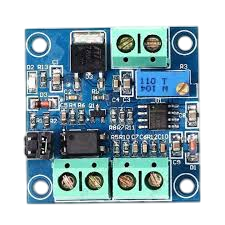Description
Autonics CR18-8AO Capacitive Proximity Sensor in Lahore Pakistan
Product Overview
The Autonics CR18‑8AO is an AC 2‑wire, normally open (NO) capacitive proximity sensor, designed in an M18 cylindrical form factor. It delivers reliable, non-contact detection of both conductive and non-conductive materials and is ideal for a variety of industrial automation tasks.autonics.comDubai Sensor
Key Specifications
| Attribute | Details |
|---|---|
| Sensing Distance | 8 mm (detects materials like metal, plastic, water, wood)autonics.comDubai Sensor |
| Detectable Materials | Metals, plastics, liquids, powders—virtually any material with dielectric different from airDubai Sensormanualzz.com |
| Output Type | Normally Open (NO), AC 2-wire (100–240 VAC)autonics.commanualzz.com |
| Response Frequency | 20 Hz (suitable for medium-speed applications)autonics.comitm.com |
| Current Details | Leakage current max. 2.2 mA; Output switching capacity up to ~200 mAautonics.commanualzz.comBaoAnJSC |
| Construction | Polyamide 6 (PA6) body; IP66 protection ratingautonics.comIndMALL Automation |
| Operating Conditions | –25 °C to 70 °C (storage: –30 °C to 80 °C); Humidity: 35–95% RHautonics.comIndMALL Automation |
| Dimensions & Cable | M18 threaded body, approx. 70 g; 2 m PVC cable includedautonics.comIndMALL Automation |
| Adjustability | Built-in sensitivity adjuster (potentiometer) for fine-tuning detection distancemanualzz.comDubai Sensor |
| Indicator | Red LED operation indicatormanualzz.comDubai Sensor |
How to Use
-
Mounting
Thread the M18 sensor body into your mounting fixture and secure with the accompanying nut. -
Power & Wiring
Connect directly to 100–240 VAC using the two pre-wired leads—no polarity concerns due to its AC nature. -
Sensitivity Adjustment
Tweak the detection range using the built-in potentiometer. Turn clockwise to increase sensitivity (range), counterclockwise to reduce it.manualzz.com -
Operating Principle
As a capacitive sensor, it detects changes in electric field when any material (solid, liquid, or granular) moves within 8 mm of the sensor face—activating the output and lighting the LED indicator. -
Environment & Maintenance
Rated IP66, it holds up well against dust and water. Maintain a clean sensing face and avoid mounting near high-frequency noise sources to ensure consistent performance.manualzz.comDubai Sensor
Key Features (“Futures”)
-
Versatile Material Detection — Capacitive sensing allows it to detect both conductive and non-conductive targets like metal, plastic, liquids, and grains.Dubai SensorIndMALL Automation
-
Adjustable Sensitivity — Built-in potentiometer makes calibration fast and flexible.manualzz.comDubai Sensor
-
Robust & Durable — IP66-rated housing and polyamide construction resist dust, moisture, and industrial wear.autonics.comIndMALL Automation
-
Visual Feedback — Onboard red LED confirms detection events—great for diagnostics.manualzz.comitm.com
-
Broad AC Voltage Range — Compatible with standard industrial voltage, 100–240 VAC.autonics.comitm.com
-
Compact Form Factor — Lightweight (≈ 70 g) and threaded design allow for easy integration into M18-compatible setups.autonics.comIndMALL Automation
Suggested Website Copy Snippet
Product Title:
Autonics CR18‑8AO Capacitive Proximity Sensor (M18, 8 mm, AC 2-Wire, Normally Open)
Short Description:
A rugged, adjustable, capacitive proximity sensor ideal for detecting both conductive and non-conductive materials with an 8 mm detection range, IP66 protection, and integrated sensitivity control.
Feature Highlights:
-
8 mm sensing distance with broad material detection (metal, plastics, liquids)
-
AC 2-wire, Normally Open output—supports 100–240 VAC
-
Built-in sensitivity adjuster and LED indicator for easy calibration and status feedback
-
IP66-rated polyamide housing suitable for dusty or wet environments
-
Lightweight M18 threaded design for quick installation
Typical Applications:
Perfect for level monitoring in non-metallic containers, conveyor part detection, packaging systems, and automation processes involving liquids or granules.
Usage Tips:
Install securely, connect to AC power, adjust sensitivity to best suit the target material, and use LED feedback for installation checks. Keep the sensing face clean for reliable operation









